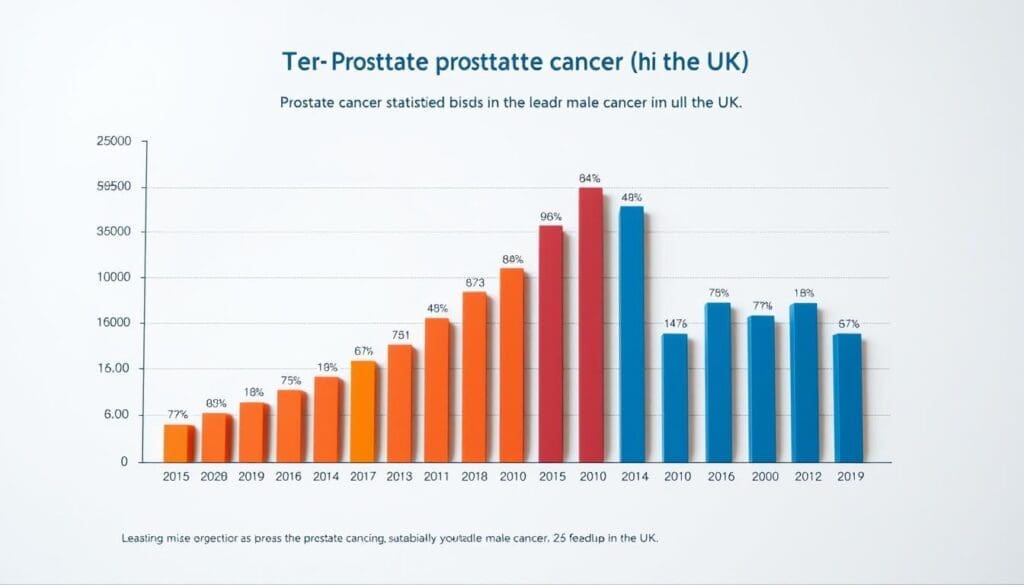Last Updated on November 27, 2025 by Bilal Hasdemir

Prostate cancer is now the most common cancer among men in the UK. It makes up over a quarter of all new male cancer cases. With more than 50,000 new cases each year, it’s important to know the latest research and its implications for men’s health.
There are big steps forward in finding and treating prostate cancer. This is thanks to projects like those funded by Eurostars-3. At Liv Hospital, we aim to give top-notch healthcare to all our patients, including those from abroad.
We will look at seven key facts every man should know. We’ll share important insights, research advances, and how these changes help patients.

Prostate cancer is a big health issue in the UK, with more cases than ever. It’s important to know about its current situation and what the future might hold.
Prostate cancer is now the top cancer in men in the UK. It makes up over 25% of new cases. This shows how vital it is to know the signs early and get checked.
More than 50,000 men are diagnosed with prostate cancer every year in the UK. Projects like Eurostars-3 are helping us learn more about the causes and how to find it early.
Experts think there will be 85,100 cases of prostate cancer in the UK by 2040. This rise highlights the need for more research into prevention and treatments.
| Year | Number of Diagnoses | Projected Increase |
| Current | Over 50,000 | – |
| 2040 | – | 85,100 |
It’s crucial to understand prostate cancer in the UK to fight it better. We need to keep supporting research to help men with prostate cancer.

Recent statistics show that prostate cancer is now the most common cancer in men in the UK. This change makes awareness and research into prostate cancer more important than ever.
In the last ten years, prostate cancer cases have increased steadily. More than 50,000 men are diagnosed each year. This rise shows how common prostate cancer is becoming.
The increase in prostate cancer cases is not just a small change. It’s a big trend. This trend affects healthcare services and how much money is spent on research.
Prostate cancer is now more common than lung and colorectal cancer in men. This change is important because it shifts how we view male cancer in the UK. More men are being diagnosed with prostate cancer than with other major cancers.
Groups like Prostate Cancer UK are crucial in helping men with prostate cancer. They offer support during diagnosis and treatment.
Several things contribute to more men getting prostate cancer. Better awareness and better ways to diagnose are key. Also, more older men and lifestyle changes might play a part. Scientists are studying these factors to find ways to lower the risk of prostate cancer.
Medical research, like in Eurostars-3 projects, is helping find better treatments for prostate cancer. This research is vital for improving prostate cancer treatment options.
We must keep supporting cancer research prostate cancer efforts. This is crucial in fighting this growing health problem.
Recent studies have shown a big jump in prostate cancer survival rates. This is thanks to new medical research. Now, we see a current 10-year survival rate of 79%. This shows how far we’ve come in fighting this disease.
The better survival rates come from focused research on treatments and diagnostics. Projects like Eurostars-3 have helped a lot. They’ve given us new insights into the disease and possible treatments.
| Year | 5-Year Survival Rate | 10-Year Survival Rate |
| 2010 | 70% | 55% |
| 2015 | 75% | 65% |
| 2020 | 84% | 79% |
Research has been key in changing how we treat prostate cancer. It has led to innovative treatments. These have not only raised survival rates but also made life better for patients.
There’s been a big leap in finding and treating cancer early. This has been crucial in boosting survival rates. Focusing more on prostate cancer symptoms and early detection has helped doctors act sooner. This leads to better results for patients.
Even with progress, there are still hurdles to cross. Black men, for example, face double the risk of getting prostate cancer than white men. Scientists are working hard to understand why. They aim to create better screening plans.
We need to keep pushing forward with research and funding. By supporting these efforts and staying up-to-date with latest prostate cancer research, we can help more patients. Together, we can achieve better outcomes for everyone.
Black men are more likely to get prostate cancer than white men. They also face a more aggressive form of the disease. This is a big concern.
The risk difference between Black and white men is complex. It’s influenced by genetics, environment, and social status. Black men often get diagnosed younger and with more severe disease.
Key factors contributing to this disparity include:
Scientists are studying why Black men are at higher risk. They look at genetics and lifestyle. Some genetic traits are more common in African men, which might explain the higher risk.
“The higher incidence of prostate cancer in Black men is likely due to a combination of genetic and environmental factors. Further research is needed to understand the underlying causes and to develop targeted interventions.”
Social factors like healthcare access and income also matter. Men with less access to care might miss out on screenings. This can lead to late diagnosis and treatment.
Because of the higher risk, experts suggest special screening for Black men. The American Cancer Society recommends starting talks about screening at 45 for those at high risk, like Black men.
| Ethnic Group | Recommended Screening Age | Risk Level |
| Black Men | 45 | High |
| White Men | 50 | Average |
Early screening can help Black men a lot. It allows for treatment before the disease gets worse.
Prostate cancer is still a major health issue for men. It’s important to understand its impact on death rates. This knowledge helps us find better ways to fight it.
In the UK, prostate cancer is a big killer of men. It’s the second biggest cause of male cancer deaths. Thanks to better diagnosis and treatment, death rates have slowly gone down. But, the number of deaths is still high, showing we need to keep working on it.
Finding prostate cancer early is key to saving lives. Early detection means a better chance of successful treatment. Studies show men diagnosed early have a much better survival rate. So, it’s important to spread the word about the value of screening and early detection.
There’s a lot of research going on to find new treatments for prostate cancer. Places like Liv Ho are helping in this fight. New treatments, like those funded by Eurostars-3, are crucial for better survival rates. These efforts aim to improve patient outcomes in the future.
By supporting research and pushing for early detection, we can lower prostate cancer deaths. This will help improve the lives of those affected by this disease.
The UK has seen a big change in prostate cancer diagnosis thanks to awareness efforts. These efforts have taught men to spot prostate cancer symptoms early and get medical help fast.
Public health campaigns have been key in raising prostate cancer awareness. Groups like Prostate Cancer UK have spread the word on prostate cancer prevention and early detection benefits. This has led to more men knowing the risks and taking action for their health.
“Awareness is the key to saving lives,” says
A leading expert in prostate cancer research. “By educating men about the symptoms and risks associated with prostate cancer, we can ensure that more men receive timely diagnoses and effective treatment.”
While awareness efforts have been successful, there are still differences in diagnosis rates across regions. Urban areas often have higher diagnosis rates than rural ones. This is because rural areas may face challenges in accessing healthcare.
Prostate Cancer UK has been leading the charge in awareness campaigns. They provide crucial info and support to men all over the UK. Their work highlights the latest in prostate cancer research and pushes for better care for patients.
Their efforts have greatly helped in increasing early diagnosis rates. By teaming up with healthcare providers and community groups, Prostate Cancer UK makes sure their campaigns are effective.
In summary, awareness campaigns have been vital in boosting early prostate cancer diagnosis in the UK. Organizations like Prostate Cancer UK will keep playing a big role in keeping this progress going. They help ensure more men get diagnosed and treated early.
Getting the right prostate cancer treatment depends on where you live and your ethnicity. This issue is big because it changes how long patients live and their quality of life.
The quality of prostate cancer care changes from place to place in the UK. Some areas have better access to innovative prostate cancer treatments and specialized care. But, others struggle to get the treatment they need on time.
Socioeconomic factors also matter a lot in prostate cancer treatment. Things like ethnicity, how much money you make, and your education can affect how well you can get care.
Research shows that:
To fix these problems, many efforts are underway. These aim to make prostate cancer treatment more accessible and fair for everyone. Some of these include:
By tackling these issues, we can make sure all prostate cancer patients get the care they deserve, no matter who they are or where they live.
The way we treat prostate cancer is changing fast. New therapies and technology are leading the way. We’re learning more about the disease every day, which means better treatments are coming.
Precision medicine is a big deal in treating prostate cancer. It means treatments are made just for you, based on your genes. This approach helps doctors give you the best care possible, making treatments work better and safer.
A top oncologist says,
“Precision medicine is changing the game for prostate cancer patients. We’re able to target the cancer more effectively and minimize harm to healthy tissues.”
New surgery methods, like robotic-assisted surgery, are making operations better. Robotic surgery helps doctors remove cancer more precisely, which means less damage to healthy areas. This leads to quicker recovery times and fewer problems.
Also, new radiation therapy methods are more accurate. They focus on cancer cells, not healthy tissues. This makes treatments safer and more effective.
There are many new treatments for prostate cancer in the works. These include immunotherapies, targeted therapies, and new hormonal treatments. Immunotherapy uses your body’s immune system to fight cancer, which is very promising.
As research keeps moving forward, we’ll see even more new treatments. These will help patients live better lives and get better care.
Prostate cancer is a big health issue in the UK, with over 50,000 new cases each year. Knowing the risk factors and taking steps to prevent it is key to better health outcomes.
Men can lower their risk by living a healthy lifestyle, knowing their family history, and going for regular check-ups. Early detection through screening can greatly improve treatment outcomes, leading to better survival rates.
We urge all men to take care of their prostate health. Be aware of the risks and seek medical advice if you have concerns. Together, we can make a difference in diagnosing, treating, and caring for prostate cancer patients.
Symptoms include trouble urinating and frequent need to go. You might also see blood in your urine or semen. Pain in the back, hips, or pelvis is another sign. But, many men with early cancer don’t show symptoms, making screening key.
Eating well, exercising, and keeping a healthy weight can help. If you have a family history or other risk factors, talk to your doctor about screening.
In the UK, the 10-year survival rate for prostate cancer is about 79%. This shows big improvements in treatment and care.
Black men face higher risks due to genetics and social factors. Poor healthcare access and quality also play a part.
Research has brought big changes in treatment. Now, we have precision medicine and new surgical and radiation methods. These advances are improving survival rates.
Awareness campaigns are crucial. They teach men about screening and symptoms. This encourages them to get checked early.
Yes, where you live can affect treatment access. Some areas have better care than others. Efforts are being made to fix these inequalities.
New breakthroughs include precision medicine and better surgery and radiation methods. These advancements lead to better outcomes and fewer side effects.
Stay informed about prostate cancer. Talk to your doctor about risks and screenings. Be aware of any health changes that might mean a problem.
Cancer Research UK: Cancer Statistics by Cancer Type: Prostate Cancer
World Cancer Research Fund (WCRF): UK Cancer Statistics
ACS Journals (Wiley Online Library): Cancer Statistics, 2025 (Full Article)
Subscribe to our e-newsletter to stay informed about the latest innovations in the world of health and exclusive offers!